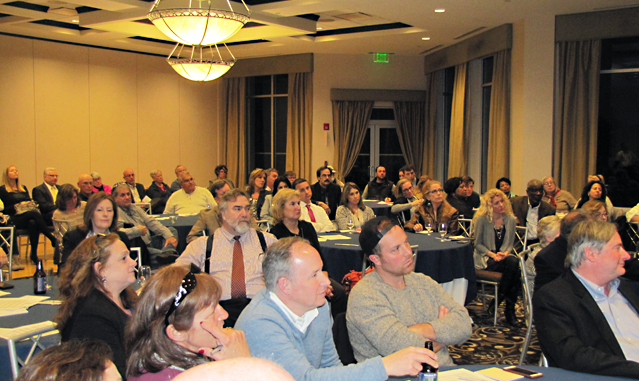Hotel, motel owners push for fairer share of tourism tax


The Suffolk County Comptroller’s Office has a three-person enforcement unit that’s going after businesses, including short-term rentals, that may be avoiding paying the county’s three-percent hotel/motel tax.
Since the group has started enforcing, over $254,000 has been levied in penalties and interest payments, according to Comptroller John Kennedy, who spoke before a joint meeting of North Fork chambers of commerce Wednesday night in Riverhead.
There seemed to be little opposition to paying the tax from the hotel, motel, and bed-and-breakfast owners at the meeting at the Hyatt. Instead, the main complaint dealt with how that money was being used and whether the East End was getting its fair share.
The hotel/motel tax, which was approved by state law in 1992 at 0.75 percent, and then increased by the state to 3 percent in 2010, generated about $9.8 million in 2015, according to Mr. Kennedy. Any rental of less than 30 days that provides nightly lodging must pay the tax, he said.
The state law that authorized the tax spells out how the funding is to be used and specifies that 24 percent is provided to the Long Island Convention and Visitor’s Bureau, a promotion council serving both Suffolk and Nassau County.
The LICVB never sees the full 24 percent, however, as there’s a $2 million cap on the amount it can receive from the tax. Had the LICVB received the full 24 percent, it would have received about $2.31 million.
Bryan DeLuca, the executive director of Atlantis Holdings in Riverhead as well as the head of the East End Tourism Alliance, asked that the cap either be made higher or eliminated.
Mr. Kennedy said that can only be done by state legislation.
Mr. DeLuca added that other communities such as Rochester and Buffalo have one-third the number of hotels that Long Island does, and still spend up to 60 percent more on tourism.
“We here on Long Island get $2 million for Suffolk County even though we raised more than $9 million,” he said.
He said the amount paid by Long Island hotels and motels is not coming back to support Long Island tourism due to the cap.
According to North Fork county Legislator Al Krupski (D-Cutchogue), the breakdown in how the money raised is spent is as follows: The LICVB gets 24 percent or $2 million, whichever is lower; the county’s cultural affairs division gets 10 percent; the Vanderbilt Museum in Centerport gets 10 percent; Walt Whitman’s birthplace in Huntington gets 1.5 percent; film promotion in Suffolk gets up to two percent; the county parks and historic services get 20 percent; various museums and historical associations get 6.5 percent; and the county general fund gets 26 percent.
That breakdown is specifically required by the state law approving the tax, which was about to expire at the end of 2015 but was extended for two years by the state legislature.
Nirena Sperl, who heads the comptroller’s investigative unit, said the money that goes to the general fund is used for parks and preservation of historical sites and parklands, and not for general government support.
George Haase of Fig & Olive B&B in Cutchogue asked how short-term rentals advertised through websites like Airbnb.com are accounted for.
Mr. Kennedy said the county had in past years sought to work out an arrangement with Airbnb regarding the hotel/motel tax, but Airbnb wanted to preserve the anonymity of its clients, which the county rejected.
“We are on those sites every day and most parties don’t list exclusively online,” Mr. Kennedy said. The homes being listed on short-term websites are usually being advertised in other forums as well, he said.
“We are finding them and we’ve gotten some of them signed up,” he said.
Southampton Town Supervisor Jay Schneiderman said the East End’s representatives in the state legislature originally voted against the hotel/motel tax.
“The person in the state assembly who really carried it was Steve Englebright (D-Setauket) and his focus is western Suffolk. That’s why we see funding for the Vanderbilt Museum and the Walt Whitman home,” Mr. Schneiderman said. “Probably the biggest tourist attraction on Long Island, the Montauk Lighthouse, doesn’t receive anything.”
When he was a county legislator, Mr. Schneiderman said he and Mr. Krupski wrote a letter to state officials asking for the $2 million cap to be removed.
He said that while the hotel/motel tax originally was opposed, “We now recognize that the tax is doing some good things. I don’t think anyone is pushing to eliminate the tax, we just want a fairer distribution of the money.”
Photo Caption: The crowd at Wednesday’s joint meeting of North Fork chambers of commerce. (Credit: Tim Gannon)
CORRECTION: In the breakdown of how money is spent, the LICVB gets 24 percent or $2 million, which is lower, not greater.






